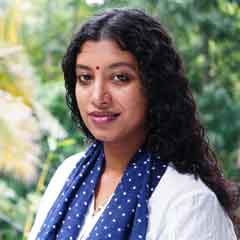Local body polls: Women fight on two fronts as parties reluctant to give out general seats

Mail This Article
Women candidates in the fray for the upcoming local body elections in Kerala are fighting a battle on two-fronts - one on the electoral front and another from their own parties discouraging them to contest in general seats.
Fousiya A, former councillor of 16th ward at Veliyankode grama panchayat in Malappuram, is one among several such women candidates.
Fousiya had begun her campaign as an IUML candidate after the IUML panchayat committee of the ward unanimously decided so. However, just before filing nominations, the IUML district committee decided to replace Fousiya with a male candidate because her sitting seat is a ‘general ward’ this time.
Political parties tend to discourage women candidates in general seats, especially after the 50% reservation for women came into effect in local self-governments (LSGs) in 2010. Despite this, women representation was 54% in LSGs last term.
As the electoral picture is getting more clear, many women candidates are finding themselves in ‘uncertain’ seats due to this policy of political parties.
A relentless Fousiya is contesting as an independent candidate now. “This ward was an LDF stronghold till 2005 when I won the seat as an IUML candidate. I couldn’t contest next year due to my wedding. Later, I came back to win the seat again, in 2015. I decided to contest this time as the people of the ward wanted it,” she said.
Similar is the case of Prathibha Jayakumar, former Congress councillor of Pallithura ward under the Thiruvananthapuram Corporation. Prathibha claims to be riding a popularity wave but the Congress decided to field a male candidate as Pallithura is a general ward this time. After her requests fell on deaf ears, Prathibha decided to contest as an independent, like Fousiya. Prathibha was informed that the party won’t nominate a woman candidate in a general seat. But advocate Soya B Rajendran, who defected from the CPI(M) to the Congress three years ago, was nominated for the general ward in Sreekanteswaram, a sitting seat of the BJP in Thiruvananthapuram Corporation.
There are cases of women contesting in general seats which are their strongholds. Due to its upper hand in Panchayati Raj and women self-help groups, the LDF leads in fielding women candidates in general seats. For the Thiruvananthapuram Corporation election alone, LDF has given general seats to six women candidates. It is two in UDF and one each in NDA and IUML (Beemapally East). The Congress and the BJP have fielded women candidates in general seats of Sreekanteswaram and Ambalathara where their opponents had won last time.
One of the significant contests is in Kunnummal panchayat in Kozhikode where the LDF has fielded women in 10 of the total 13 seats. Reetha V K, who is contesting from Mokeri East ward, a general seat, said the panchayat had never shied away from giving power to women. “Ours is a panchayat which has elected a woman president even before reservation came into effect for the president’s post. K K Lathika was the panchayat president from 1995 to 2005. So, it is not a surprise that the LDF is fielding women in 10 out of the total 13 wards,” she said.
J Devika, a faculty member at Centre for Development Studies, who has done studies on women in Kerala politics, said women were part of the political game after 50% reservation that they could not be ignored now. “Earlier, women were known as political cleaners. Now, they are part of all nitty-gritty, including corruption. Thus, women have become an irreplaceable force in local politics. Unfortunately, this doesn’t progress into representation in Assembly or parliamentary elections,” Dr Devika said.
Navaneeth M S, a student at the department of humanities and social sciences, IIT Madras, who conducted a study on ‘Reservation for women in Kerala's local self-government institutions’ in September 2020, observed that despite the flaws in policies, the reservation was showing results.
Newly elected women tend to study as well as comprehend the government machinery within the first seven months and the people perceive women representatives to be more approachable, enthusiastic, and less corrupt.
One of the important observations of the study conducted by Navaneeth was the ineffectiveness of the rotation system in the reservation. “The present system has a rotation component for the seats every five years. The opportunity given by reservations in panchayats allows for leadership development but its effectiveness is being hampered in the form of rotation of reservations, particularly the mandatory rotation in the post of chairperson. This points to the need to rethink the system of rotating seats reserved for women so that they are given 10 to 15 years of continued opportunity,” the study said.
Observing that women do stand as proxies for male candidates, the study found that 70 per cent of women representatives had no interest in taking up the issues affecting womenfolk like dowry, domestic violence or alcoholism as it irked the men in the constituency. “More than half of women who were surveyed said they would not seek re-election due to the heavy repressive stance they faced from the political circles and due to familial obligations,” Navaneeth said.
The study found that women are judged on a different scale compared to their male counterparts. “A woman representative is expected to be a torch-bearer of the ‘ideal’ form of a Malayali woman and is perceived to exercise ‘gentle’ power which is considered as a feminine quality, similar to the one she exercises back home, which is subordinate to male power,” the study said.
(Jisha Surya is an independent journalist based in Thiruvananthapuram. To read her previous works for Onmanorama, click here.)


